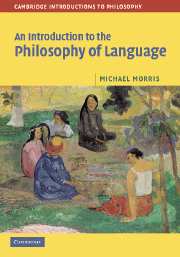Book contents
- Frontmatter
- Contents
- Acknowledgements
- Introduction
- 1 Locke and the nature of language
- 2 Frege on Sense and reference
- 3 Russell on definite descriptions
- 4 Kripke on proper names
- 5 Natural-kind terms
- 6 Quine on de re and de dicto modality
- 7 Reference and propositional attitudes
- 8 The semantics of propositional attitudes
- 9 Davidson on truth and meaning
- 10 Quine and Davidson on translation and interpretation
- 11 Quine on the indeterminacy of translation
- 12 Austin on speech acts
- 13 Grice on meaning
- 14 Kripke on the rule-following paradox
- 15 Wittgenstein on the Augustinian picture
- Glossary
- Works cited
- Index
1 - Locke and the nature of language
Published online by Cambridge University Press: 05 June 2012
- Frontmatter
- Contents
- Acknowledgements
- Introduction
- 1 Locke and the nature of language
- 2 Frege on Sense and reference
- 3 Russell on definite descriptions
- 4 Kripke on proper names
- 5 Natural-kind terms
- 6 Quine on de re and de dicto modality
- 7 Reference and propositional attitudes
- 8 The semantics of propositional attitudes
- 9 Davidson on truth and meaning
- 10 Quine and Davidson on translation and interpretation
- 11 Quine on the indeterminacy of translation
- 12 Austin on speech acts
- 13 Grice on meaning
- 14 Kripke on the rule-following paradox
- 15 Wittgenstein on the Augustinian picture
- Glossary
- Works cited
- Index
Summary
Key text
John Locke, An Essay Concerning Human Understanding, book iii, chs. 1 and 2.
Introduction
This book is an introduction to philosophy of language in the analytic tradition. Analytic philosophy begins with Gottlob Frege, who wrote at the end of the nineteenth and the beginning of the twentieth centuries. So why begin this book with John Locke, whose principal work was written at the end of the seventeenth century? Briefly: because Locke presents in a clear and simple way the background to analytic philosophy of language.
In the first place, Locke's general theory of language initially strikes many of us as extremely natural. His views about what words are and what language is for are shared with almost the whole analytic tradition. But he is also a clear representative of a line of thinking about language which has been the main target of much of the analytic tradition. Frege's philosophy of language can be said to begin with a rejection of what seem to be central features of Locke's view. And much recent work on proper names and natural-kind terms (the topics of chapters 4 and 5) is defined by its opposition to a broadly Lockean kind of view.
What Locke says
One of the four books of John Locke's vast and seminal work, An Essay concerning Human Understanding, is dedicated to language. The core of his conception of language is laid out in one paragraph; here it is:
Man, though he have great variety of thoughts, and such, from which others, as well as himself, might receive profit and delight; yet they are all within his own breast, invisible, and hidden from others, nor can of themselves be made appear. […]
- Type
- Chapter
- Information
- An Introduction to the Philosophy of Language , pp. 5 - 20Publisher: Cambridge University PressPrint publication year: 2006



